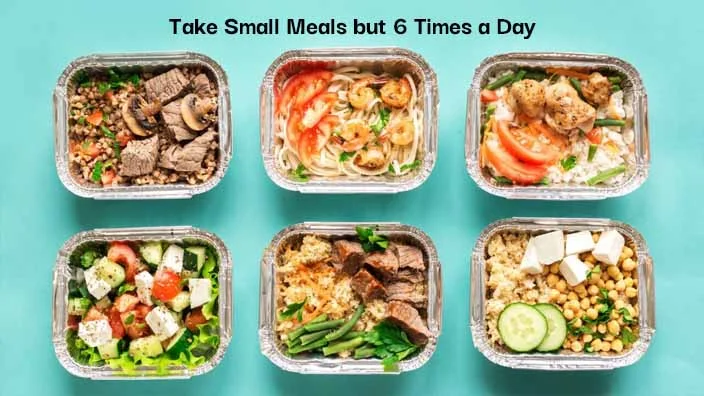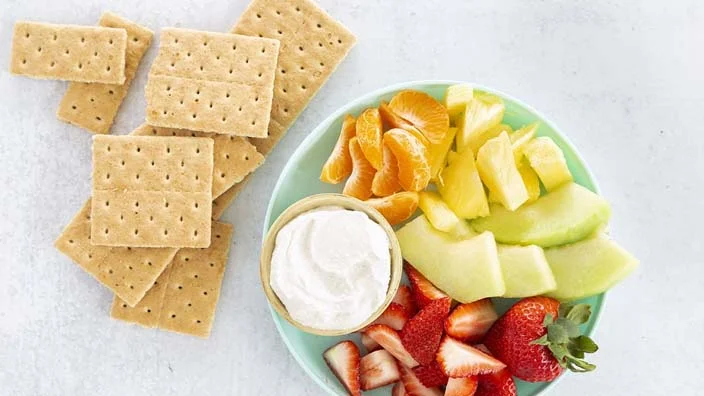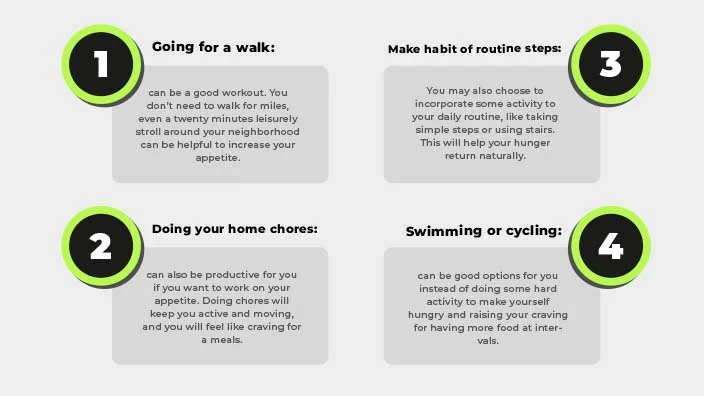Don’t you feel hungry anymore as you used to be? Are you looking for the ways to boost your hunger or want to know how to make yourself hungry? Obviously, In the hustle and bustle of our daily lives, it’s not something uncommon to find ourselves facing the unexpected challenge of a decreased appetite.
Considering the significance of learning the methods to increase hunger, inviting you to eat more; we have covered all relevant aspects including but not limited to causes leading to loss of hunger, andmeans to increase hunger; lets dive into the article to feed the thinking and thought process.
Table of Contents
Loss of Hunger Needs Treatment?
Life’s demands can give a tough time, sometimes, to our physical and mental well-being, impacting badly our eating habits in ways we might not even be aware of.
From the pressures of work deadlines to the strains of personal relationships, our bodies often react to stress by getting our appetite suppressed. Additionally, certain health conditions, some medications, or even emotional factors can disturb natural inclination to eat.

You need not to fear, there are some effective strategies to stimulate appetite inside yourself for more food. So, if you want to make a healthier relationship with food and rekindle the flame of appetite inside yourself, just read on this article as it’s going to unravel some secrets about how to become hungry.
Related Article: How to increase appetite
Why Loss of Hunger
If you are not feeling much hungry nowadays, it’s never a good thing surely, there might be some reasons behind your lack of interest in foods. That’s why, before we share with you some strategies and ways that can help in increasing your hunger.
Let’s discuss the factors that lead to loss of hunger, that you might be facing any of them even without realizing. So, let’s get into the reasons that cause lack of hunger: -
Stress Factor
Stress and anxiety can be reasons behind lack of appetite as they trigger the release of stress hormones in humans, like cortisol, which can potentially suppress appetite. Depression may result in lack of interest in food and eating. Emotional well-being is tied to our eating habits very closely.
Illness Issue
Illnesses, especially those accompanied by fever or inflammation, can cause a decrease in appetite. The body may divert its energy to fighting the illness than digesting food.
If you are facing the problem of decreased hunger, better evaluate your health condition and Keep an eye on symptoms like feeling fever, fatigue, or nausea.
Medications
Among various factors that lead to a loss of appetite, certain medications can play their role as well, such as some antidepressants, antipsychotics, and chemotherapy drugs that can result in appetite changes as a side effect.

If you have recently begun to get a new medication, better check its side effects followed by consulting your healthcare professional.
Some underlying health conditions such as hypothyroidism, hyperthyroidism, diabetes, or gastrointestinal issues can also badly affect appetite.
It’s possible that hormonal imbalances or disruptions in the body’s regulatory systems might be contributing to the lack of appetite you feel.
Dietary Habits
One of the reasons that lead to loss of appetite is not having good dietary habits. Unhealthy eating habits or irregular meal timings, or even extreme diets with very low-calorie intake can impact your hunger.
Processed foods, high in sugar and refined carbs, may not be enough to provide sustained energy to the body.
Dehydration
Dehydration can sometimes mask itself as hunger. It’s necessary to stay hydrated throughout the day. So, Drink water regularly, and consider the moisture content in foods like fruits and vegetables.
Hormonal Changes
Fluctuations in hormones during the menstrual cycle or pregnancy can affect appetite. Changes in estrogen and progesterone levels may cause alterations in taste preferences and cravings.
Age Factor
As people get older, their metabolism may slow down, and, resultantly, there is possibility of decline in physical activity. Additionally, older adults may experience changes in taste and smell, and they gradually stop eating more food.
Get Hungry - Changes in Diet
As already explained, there can be various reasons behind you not feeling hungry. Though, feeling no hunger during a hot weather or after being overindulged the day before can be normal. But, a long-term hunger loss isn’t good for your wellbeing.
There is nothing to panic, as we have got for you some tips and strategies that can help stimulate appetite. You’ll just need to make small routine changes and try a couple of things as your intakes: -
Have Small Meals
When low hunger becomes your routine, it seems challenging to eat three full meals of large portions than one should eat smaller portions or skipping meals. One loses the urge to finish a food that looks gigantic.

But don’t panic. You’ll just need to have your meals in smaller portions and divide the three big meals into six or five small meals. Why to do this? It’s just because when you have a smaller meal before you, you feel like finishing it in a nip.
Try it out, and as you begin to feel like getting your appetite improved, you may begin add more to the small portions of your meals and add more ingredients so that you consume more and more calories a day.
Eat nutrient-rich foods
You can’t deny the importance of consuming foods rich in nutrients. What’s is mostly the case that those who don’t have a good appetite go for eating certain foods high in calories, such as baked goods, candy, ice cream and chips in order gain weight.
There are heaps of foods that are high in calories and can potentially provide nutrients like proteins and healthy fats. For instance, you can take a cup of plain and full-fat Greek yogurt, adding some berries for sweetness, instead of having ice cream for dessert.
Have Favorite Foods
Make sure when you sit down to eat some food placed in front of you, make it sure that it’s yourfavorite food, a food that appeases you the most i.e. eating spicy food, delicious food, nutritious food rather nutrient dense foods, even junk food of your taste as part of healthy diet or healthy appetite.
It’s been proved by a research that those who can choose, they have a tendency to eat more of it than if they don’t have any option to pick the food you enjoy. Thus, its better you decide what to be cooked or eaten beforehand to get them available on your table. This is one of the best tips to consume more of a food.
Don’t drink with meals
Drinking fluids before or during meals might have a negative impact on your appetite. People drink a glass of water before or during regular meals for weight loss.

it’s a well-known trick as it makes them feel fuller, and, even, it has been suggested by some researches that drinking water before meals can result in reduced calorie intake.
But you have to do the opposite, because you already don’t feel hungry enough to have even your three meals properly. So, limit your water intake to thirty minutes before meals and check out whether your appetite increases.
Experiment the food
Another reason behind your low appetite could be not experimenting with your food. When you are stuck in the same few meals for seven days of the week or even more, it becomes boring and less appeasing to have meals.
If you want to increase your hunger, don’t get going always with same food. Instead, keep adding new dishes to your meals. When you become open to new dishes, it can rekindle the flame of appetite inside you.
Eat less fiber
Some people go for taking high fiber foods for weight loss, because diets with high fiber promote a feeling of fullness, consequently decreasing the calorie intake for those who look for losing their weight.
Thus, you need to moderate your intake of fiber to increase appetite. Once you realize that your appetite has improved enough to consume food equal to the three main meals of the day, you may leave the ’low-fiber’ strategy so that your health doesn’t get affected by low fiber intake.
Drink Calories
If you are having a hard time to get yourself hungry and even chewing a couple of bites from your meals seems challenging to you, you may try out another way that is drinking your calories.
If you feel full all the times and doesn’t have enough urge to eat, you can replace your meals with some nutritious and high calorie drinks, such as Juices, milkshakes and smoothies. Additionally, milk and yogurt can also be tried out as good sources of proteins for extra calories.
Even, it has been suggested by research that liquids are not as satiating as solid foods. Thus, it can be ideal way out for you if you are having a low appetite.
Add healthy snacks
It sometimes feels a bit intimidating to eat big meals. On the other hand, one is convenient with the easy-to-eat snacks that don’t take enough effort to increase food intake. Additionally, snacks are also good when one is on the go.

Thus, incorporating healthy snacks is a good choice for you if you are not feeling hungry enough to eat big meals.
You may go with healthy snacks like
- Fruits, such as bananas, oranges and apples
- Cottage cheese or Greek yogurt
- Salty snacks, such as popcorn or trail mix
However, it should be kept in mind that snacks shouldn’t be meant to replace your big meals. Rather, they should complement them. Thus, it’s better avoiding snacks near to meal times, else your appetite may get affected.
Chewing gum
Another interesting way to make yourself hungry is chewing gums, as it is helpful in calming your stomach and encouraging your system to begin production of gastric juices.
Drink water
If you are the one who usually doesn’t drink water often throughout the day, then, you need to drink a glass of water in order to help yourself feel hungrier, as water doesn’t contain any calories and you will, consequently, feel like having empty stomach.
Increase appetite – Changes in Practices
If you bring any of the following practices in your daily routine, that could also largely affect your eating patterns and help you making yourself hungry: -
Breakfast is mandatory

If you really want to increase your appetite, ensure doing breakfast without skipping it, because skipping a meal can reduce your daily calories intake as well as diet quality, which has been found by recent studies as well.
Thus, if you want to increase your appetite, make it sure that you don’t skip main meals of the day, especially your breakfast.
Present meals attractively
You can’t deny the association of your vision sense with your appetite. Obviously, if the food you are going to eat is not looking good enough to attract you, then, you won’t feel enough inclination to having it.
Thus, arrange your foods in a way that it’s aesthetically pleasing. You can do this with garnishes like sauces, lime wedges, lemon wedges etc.
Eat slowly
When you eat slowly and chew your food properly instead of devouring larger scraps of meals, it helps your digestive system do its job quickly. In this way, you don’t feel full all the times and your appetite returns very quickly after having a meal.
Take proper sleep
Lack of sleep can also lead to loss of appetite as well as weight gain, because taking proper rest raise your hunger. If you aren’t getting enough sleep, your body can resultantly get stressed, and this means, for some people, ignoring hunger cues owing to anxiety and eating lesser.

Additionally, the motivation to prepare healthy, filling meals can also be squashed by tiredness throughout the day. Thus, to increase your appetite, you have to make it sure that you are taking enough sleep of around 7 or 8 hours if you are an average adult.
Schedule Meal Times
Plan your meals to increase appetite. It’s not necessary to line up your eating habits with society’s expectations about what time you should have your meals.
Thus, make a schedule for each of your meals around times of the day you get most hungry.For instance, if your Unger arouses around 10 in the morning, or you feel hungry at 3 PM or 7 PM, then, it’s fine for you to adjust your meals’ schedule with that, rather than you force yourself to get hungry when you are not supposed to.
Another way to write down your meals schedule is by dating your fullness on a scale 1 to 10 in order to figure out good times of a day to eat. When you feel that your fullness is at its lowest, it’s good time to schedule your main meals.
Record Eating Patterns

An important thing you can do to keep record of what you eat is by writing it down in a diary to ensure that you consume enough calories on daily basis. When you record your hunger levels and food intakes , it helps you figure out how does your appetite progress.
Try to keep record of each of your meals and snacks, whether small or big. When you are having a poor appetite, every calorie, to say, counts towards your goal of the day.
Make mealtime enjoyable
When you cook and eat meals with others, it may help stimulate and increase your appetite. So, if you’re not feeling hungry enough to eat a meal when you are alone, try to have it with your friends. It may stimulate your appetite to have more food.
Tackle stress
Stress can make you put off your meal, not letting you listen to it tune into your body’s hunger cues. In order to reduce your stress levels, try to do some regular activity and breathing exercises, give priority to your sleep, consider yoga or some mindfulness meditation as well as some supplements for increasing appetite.
Stay active to raise hungry
Staying inactive all day might be reason behind your poor appetite. Getting involved in some physical activities is necessary to keep your body moving to digest food. Just get yourself engaged in some physical activities.
You don’t need to do hard exercises either, walking around to chores is also a light exercise to stimulate hunger as reflected below: -

Conclusion
To say briefly, If you want to make a healthier relationship with food and rekindle the flame of appetite inside yourself, just try out any of the above given strategies and tips you can. Just keep in mind that your physical activeness, paired with exercising lightly, is the key behind a good appetite.
However, if you need something quick to know the answer how to make yourself hungry or invite hunger; then try to keep yourself active for a small portion of the day, try out all the tips regarding your diet outlined above and also try to tackle the factors that prevent you from getting hungry.
Hopefully, all the tips outlined in the article will help you recover your appetite, making you eat as you used to be.
Frequently Asked Questions
What makes you hungry fast?
Being engaged in some physical activity is one of the best strategies you can try out. However, eating less fiber, having small but frequent meals and presenting your foods in an attractive way are some good strategies among others that you can try out.
How do you make yourself hungry when you’re not hungry?
However, being engaged in some physical activity is one of the best strategies you can try out. However, eating less fiber, having small but frequent meals and presenting your foods in an attractive way is good to stimulate appetite.
What foods trigger hunger?
To trigger hunger, have foods that are high in refined carbohydrates, sugars, and low in fiber. These include sugary snacks, white bread, and processed foods. Consuming balanced meals with protein, fiber, and healthy fats can also be helpful in managing hunger more effectively.
What are the causes of lack of appetite?
Factors, such as stress , sickness, medications, hormonal changes, aging or dehydration, can lead to loss of hunger, and it’s possible that you might be facing any of them even without realizing it.


















